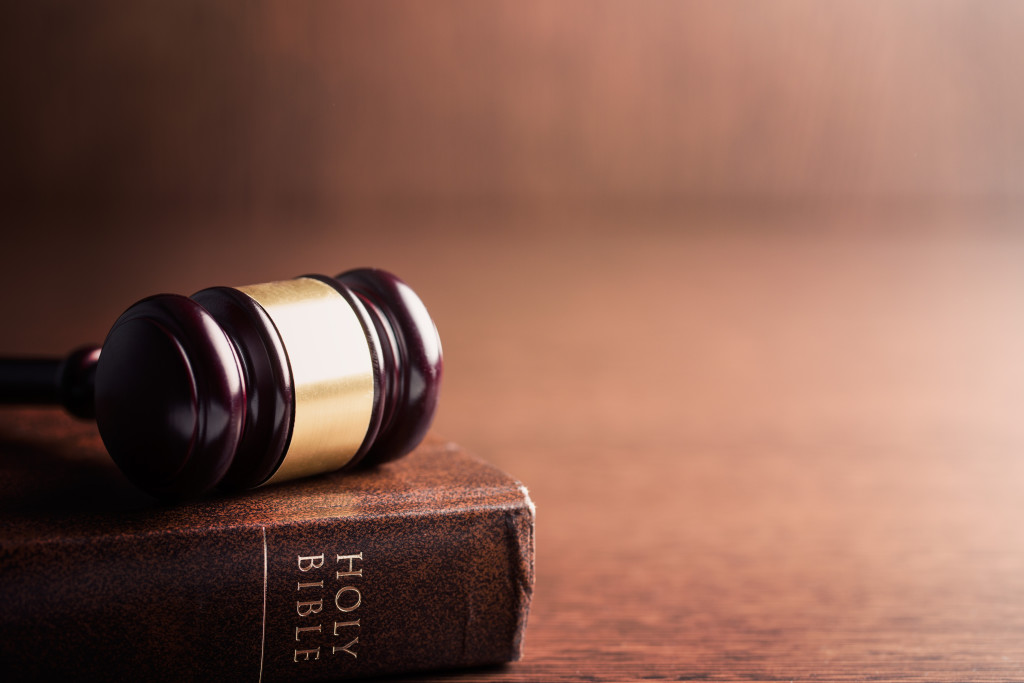Anyone who pays attention to the news knows that Evangelical Christians have supplanted Jehovah’s Witnesses and the Amish in religious liberty litigation. Think of the HHS mandate litigation (now on hiatus after the Court hit the “pause-and-compromise” button last month) and the sundry cases involving those who cannot in conscience participate in same-sex weddings. The latter cases are farther reaching, mainly because sexuality pervades more of our common life than does abortion. Add to this pervasiveness the fact that conceptions of the nature and meaning of sexuality are proliferating faster than anyone’s capacity to fully comprehend, and you have a roiling system-wide challenge. The Christians in these cases are not asking, as some contend, for a “license to discriminate.” On the contrary, they are seeking to make just law in light of everyone’s legitimate interests and the overall common good of our society.
Justice Kennedy did religious liberty one favor in last June’s same-sex marriage case when he wrote for the Court: “Many who deem same-sex marriage to be wrong reach that conclusion on decent and honorable religious or philosophical premises” [emphasis added]. Yet, paradoxically, he goes on to write that when such a “sincere” view “becomes enacted law,” the “necessary consequence is to put the imprimatur of the state itself on an exclusion that soon demeans or stigmatizes those whose own liberty is then denied.”
The newsmaking cases these days pertain to the space between “decent” personal opposition and the “imprimatur” of “enacted law.” How can the law accommodate those “decent” objections where same-sex marriage has already become “enacted law”? And how should judges who object to same-sex marriage adjudicate these cases?
Serving and Presiding Over Same-Sex Wedding Ceremonies
Start your day with Public Discourse
Sign up and get our daily essays sent straight to your inbox.The wedding cases so far decided have mostly adopted the view that legal protection of conscientious religious objection is tantamount to giving an imprimatur to a “demeaning” opinion of gay men and lesbians, as if there is no difference between laws limiting marriage to opposite-sex couples and laws that make allowance for “decent and honorable” personal unbelief in same-sex marriage.
But this is surely mistaken. For one thing, it does not follow from Obergefell. Besides, the objectors in these cases object only to serving same-sex weddings, not to serving gay or lesbian customers as a group. Consider the case of Baronelle Stutzman, a florist who faithfully served a gay customer for nine years, demurring only when he asked her to work on his upcoming wedding. The decided cases fudge this crucial distinction by saying that same-sex marriage is identified with gays and lesbians, so much so that opposition to it is opposition to them. But this is gratuitously to deny the distinction between acts and person, a distinction upon which Christian morality—and any sound moral system—depends.
We do not typically judge any case of religious freedom to be an endorsement of the soundness of the relevant religious convictions themselves. The bases of these religious freedom cases have rather been that these positions are the sincere belief of someone or some community, and that it is a good thing for our polity to protect religion and to promote conscientious decision-making so that persons can direct their own lives and live them with moral integrity.
Much has been written about the HHS mandate and same-sex wedding cases, but one aspect has been neglected: namely, the crisis of conscience that these cases present to the religious judges who must adjudicate them. Eleventh Circuit Judge William Pryor broached the subject yesterday in a brilliant lecture delivered at the Cato Institute. I should like to add the following considerations to those advanced by Judge Pryor.
My commentary here is not primarily on the topic of Christian judges actually presiding at same-sex marriages. Those are clear cases: to preside over a same-sex wedding is to formally cooperate in the legal recognition and approval of that relationship as a marriage, and thus as a socially sanctioned sexual relationship. For those who believe that marriage can only take place between a man and a woman, doing this is morally impermissible.
But I will quickly mention the very important case of Ruth Neely, a Wyoming municipal court judge whom a panel of the state Commission on Judicial Conduct and Ethics recently recommended be removed from office because she publicly expressed her religious opinion that marriage is the union of a man and a woman. The Commission alleged that Judge Neely manifested “bias or prejudice,” that her statements could undermine public confidence in the judiciary, and that they bear “the appearance of impropriety.” In my opinion, it is much more likely that removing a judge from office simply because she is a Christian will lead to a widespread loss of faith in the judiciary. Judge Neely was never actually asked to perform a same-sex marriage, and so she never refused to do so. No allegation of non-performance of assigned duties was lodged against her. So we can leave aside any hypothetical in which accommodating conscientious objection to same-sex marriage would result in a public official’s substantial incapacity to do her job.
What’s happening to Judge Neely is tantamount to imposing a religious test for office. The legal profession—bench and bar—should rise up to arrest this very troubling development.
How Should Religious Judges Adjudicate Same-Sex Wedding Cases?
The main line of analysis has to do with judges who are called upon to enforce laws requiring private business owners who object to same-sex marriage either to violate their consciences or to face potentially ruinous legal penalties. Even if a judge sitting in these cases avoids formal cooperation with this injustice by making clear that the law does not accord with the judge’s own view of what justice requires, by ruling to enforce the law the judge is materially cooperating in injustice. In this way, a judge who intends the good of applying law in a just polity nonetheless plays an essential role in perpetrating an injustice.
What is that judge to do? Is recusal necessary? Would resignation ever be the morally honorable course? Or the only morally eligible thing to do?
Any general consideration—including this one—of such situations can only identify factors that judges ought to consider in deciding what to do. Material cooperation in immorality is sometimes justified and sometimes not. Determining this depends on a careful consideration of all of the relevant factors. Some of these factors are contingent matters of fact, such as estimates of probable social effect of one course as opposed to another. Even some personal factors can be relevant, such as whether (for example) a judge must consider the impact on his or her family if one course of action is likely to lead to personal attacks or a loss of employment.
This is not to suggest that there is no right answer. Far from it. I simply wish to point out that the right answer may vary—within certain bounds—according to precise circumstances peculiar to a certain case or a particular judge. Let me conclude, then, by identifying four important considerations relevant to every case of the sort we are investigating.
Four Important Considerations
First: in a just society such as ours, giving judgment in accord with the law is good in itself. Doing so ought to be presumed to be obligatory in any given case. Judges in America rightly presume that the laws are just. They correctly infer from this reality that they formally cooperate with legislators and with executives so that the government as a whole promotes the common good. And, insofar as judges apply determinate, binding legal norms rather than make laws, it is unlikely that anything in giving judgment need be formal cooperation with any evildoing embodied in existing law. However, this presumption is open to revision if there is evidence that a particular law is unjust. No one—including judges—should take the existence of legal obligation to be conclusive of what morality requires.
Second: an obvious factor weighing against giving judgment is the harm to the wedding service provider. Generally speaking, making it impossible for someone to perform an act required by one’s religion is bad. But it is generally not as bad as pressuring someone to perform an act that that person judges to be against his or her conscience. Taking away a prisoner’s prayer rug or beads is clearly unjust, but at least such brute force does not engage the prisoner’s own deliberation or choice. Thus, it cannot corrupt his conscience and so break down his integrity as a thinking, choosing, acting person. But this is what our judge is liable to do: threaten a person with bad consequences for doing what the person believes firmly is his or her moral duty. This threat engages the deliberation and choice of the defendant, and so tempts that person to act contrary to conscience.
Third: because most of these conscientious objectors are Christians, who characteristically believe that there are certain things they simply must never do, these objectors are often faced with a choice between violating their consciences and abandoning a trade or profession. So it is no exaggeration to worry about an ideological purification of these lines of work.
This leads to the fourth of our general considerations: namely, the worry that a particular judicial decision will contribute to a broader degradation of the whole notion—indeed, the whole possibility—of moral integrity. One religious liberties commentator recently described the emergent division of our social map as “carnival in private, conformity in public.” A judge concurring in the New Mexico Supreme Court against a Christian wedding photographer used a different phrase. With it—and an invitation to critically reflect upon it—I shall end.
In our emerging legal climate, Christians are to be admired for their dedication to moral principle, and they are welcome to act in accordance with it at home and at church. But once they venture into the world of commerce, they must act according to a different set of norms. For, Justice Bosson asserted, such compromise “is the price of citizenship.”













